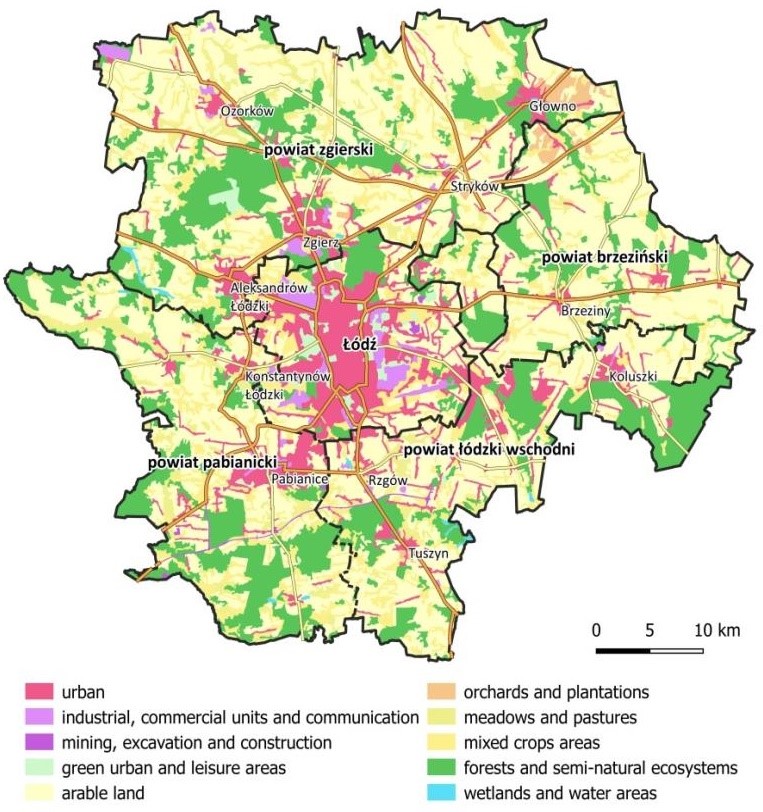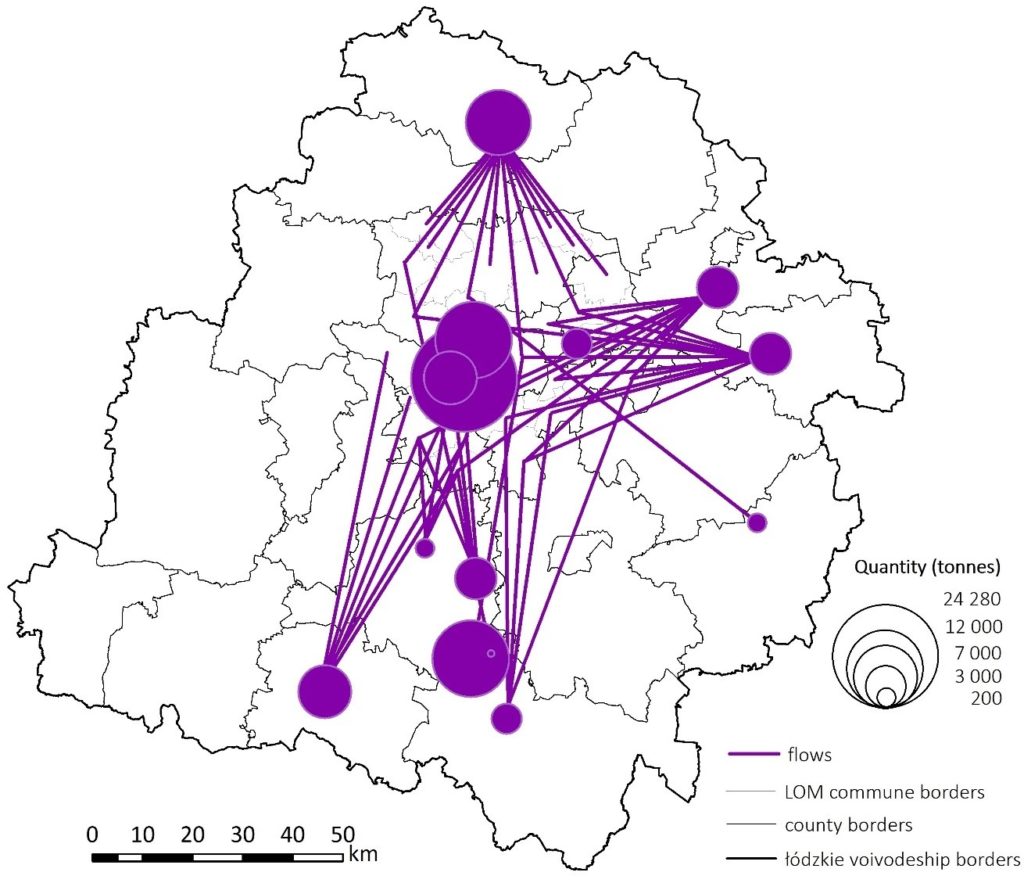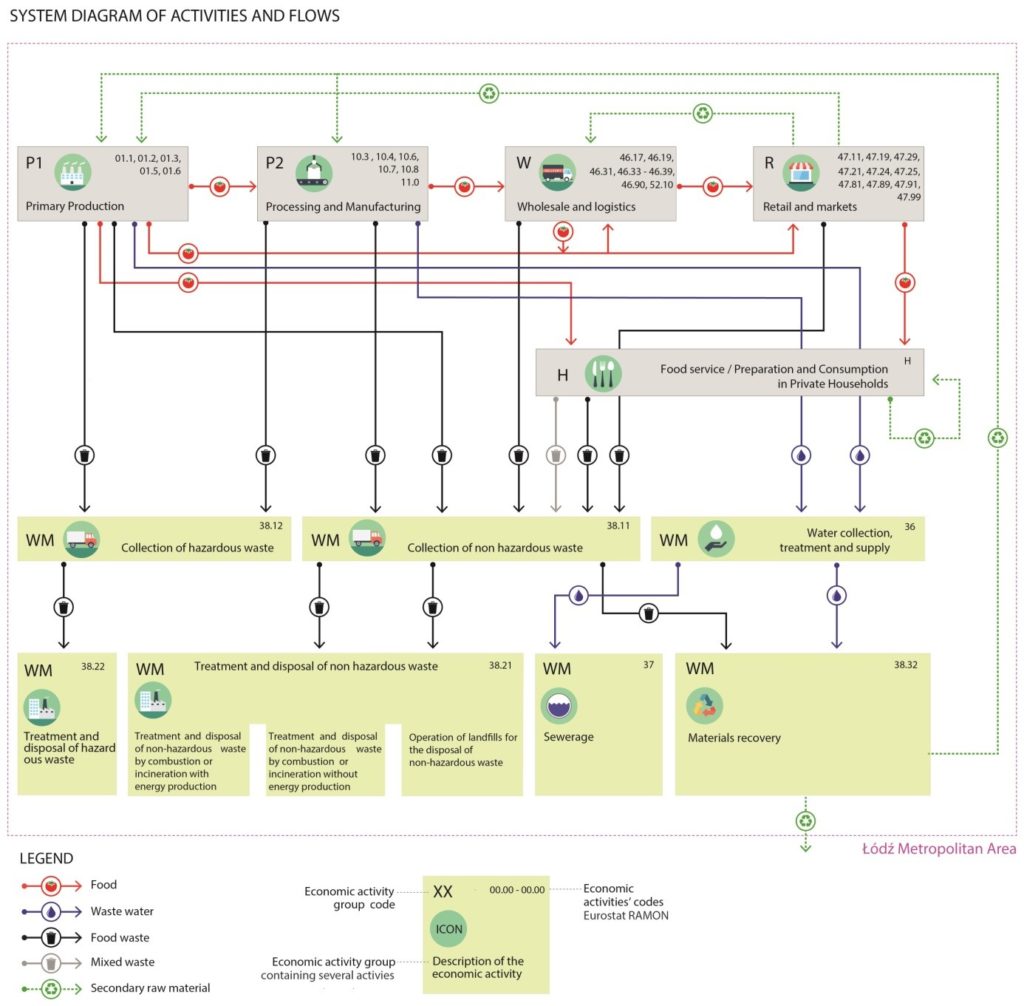Region Area
The Łódź Metropolitan Area (in Polish: Łódzki Obszar Metropolitalny, abbreviated as ŁOM) is located in central Poland and comprises the main communication hub on the north-south (Gdańsk-Upper Silesia) and east-west (Warsaw-Poznań) axes. The ŁOM area is characterized by a generally lowland landscape with slightly varied terrain relief. ŁOM encompasses five counties – NUTS 4 administrative units (City of Łódź, Łódź East, Brzeziny, Zgierz and Pabianice) and has an area of 2500 km2. It consists of 28 communes NUTS 5 administrative units, inhabited by over 1.1 million people. Spatial distribution of 12 urban centres is relatively polycentric with a clear demographic and functional domination of the city of Łódź.
Land use in Łódź Metropolitan Area, 2012.
Key priorities
The processes of de-agrarianisation and uncontrolled urban sprawl contribute to problems linked to reuse and recycling of solid waste, water supply, wastewater and poor air quality.
Aim / objective
During the PULL meetings a collection of over 30 examples of problems and challenges related to waste management in the Łódź Agglomeration was successfully compiled. At the end, discussed issues were grouped into five main blocks – (1) Social Attitudes, (2) Spatial Planning, (3) Technology, (4) Legislation and (5) Finance.
Group of problems and challenges “Social Attitudes”:
- Low social awareness, including decision-makers regarding the need to support waste management processes;
- Lack of social acceptance for local-use solutions, for instance concerning construction of micro-incineration plants;
- Often the constraint is the lack of acceptance for necessity of incurring the costs of waste collection, since they potentially are a valuable resource – for further commercial use;
- There have been registered numerous illegal incinerations of household waste;
- There is still a mental problem – waste segregation is regarded as a challenge – in contrast to the societies of Western Europe, where waste segregation is the norm;
- It is necessary to conduct educational, pro-environmental activities;
- Lack of social courage to counteract undesirable behavior;
Group of problems and challenges “Finance”:
- The problem for the implementation of waste management processes is the limited possibility of financing the activity;
- Lack of business models allowing for improving waste management processes;
- It is necessary to enforce new economic approach towards waste – as an actual resource that can be re-used for the production of goods;
- Inappropriate use of waste management funds (e.g. too low product subsidies) – business models to be verified;
Group of problems and challenges “Legislation”:
- Lack of reliable analyzes/simulations regarding actual needs in terms of providing waste management infrastructure;
- Lack of responsibility in terms of organic waste management;
- Lack of possibility for rational sewage sludge management;
- Not respecting even the existing legislative solutions in the field of environmental protection, maintaining cleanliness and waste management;
- Unregulated legal conditions affecting difficulties regarding arranging space for activities related to waste management;
- Lack of effective control methods for processes being conducted;
- Lack of a well-functioning, effective flow monitoring system (this system should consider large-scale processes);
- Lack of transparent waste management system in the Łódź Agglomeration (division into sub-regions), the Agglomeration does not have a dedicated Regional Communal Waste Management Facility (so-called RIPOK)
Group of problems and challenges “Spatial Planning”:
- The problem lies in the lack of ensuring the development of infrastructure related to waste management in the planning documents (areas explicitly indicated for the location of facilities such as waste sorting plant accepted by local community have not been included);
- The processes of suburbanization in the Łódź Agglomeration significantly affect the increase of costs related to waste management (e.g. costs of waste collection) which is a factor hampering the functioning of enterprises in this sector;
- The problem in the Łódź Agglomeration – especially in areas of high environmental assets – are the effects of “dispersed tourism” – significant pollution of green areas (e.g. landscape parks). Illegal waste often becomes a deadly trap for wild animals living in the area;
- Dramatic contamination of waters (e.g. retention reservoirs) resulting from uncontrolled location of zoonotic waste;
- Pollution of river valleys – resulting from agricultural activity in the region;
- In the areas of downtown development (Łódź inner-city) or central parts of small towns – difficulties in finding sufficient space for collecting waste;
Group of problems and challenges “Technology”:
- Individual studies on processes related to management of municipal and production waste should be considered;
- Lack of technological lines allowing for improvement of waste management processes;
- Not entirely harnessed opportunities resulting from energetic potential of waste – in this cases regulations at state level are required (use of waste in the energy sector);
- The use of central heating systems by the means of waste incineration processes is worth considering;
- An attempt must be made to enforce the method of controlled waste incineration, thus avoiding the cases of “uncontrolled fires”;
- There is a need to limit the use and thus production of non-recyclable materials (e.g. certain types of plastics);
- Lack of commercial biogas plants that could contribute to solving the problem of organic waste management;
- Post-production waste problem related to zoonotic waste;
Key flows – foodwaste
The main key flow in Łódź peri-urban area are municipal solid waste. Considering statements of the User Board members, PULL workshops’ participants and bearing in mind challenges facing the Łódź agglomeration in the field of proper waste management, it was decided to conduct the material flow analysis concerning- biodegradable municipal waste regarding the Vegetable, Fruit and Garden (VFG waste) fraction. The selected scope of study may serve as a good example in light of the need to solving issues resulting from the necessity to reduce the vast amount of waste collected in a non-selective manner. Biodegradable waste is entirely in line with the ideas of a circular economy. Moreover, it is crucial the mass of accumulated waste in this category (VFG waste) from households is sufficient to allow statistical analysis of flows.
The total VFG waste mass is estimated to be 76.57 thous. tons, which comprises 22% of all municipal waste. The map below illustrates the VFG waste flows between agglomeration’s communes and treatment points – a very distinct geographical regionalization is visible, in terms of spatial proximity. The following maps present VFG flows in detail for each of the 28 communes in the ŁOM.
VFG flows from communes of Łódź Metropolitan Area in 2016.




